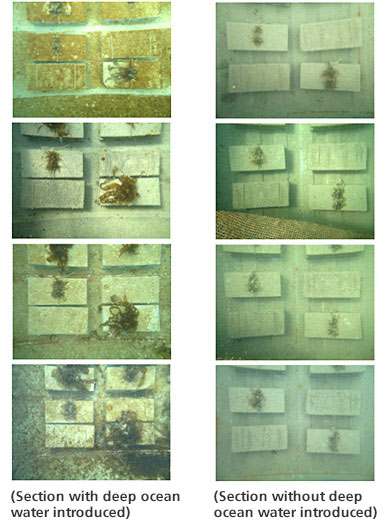Research on New Methods for Increasing Production of Marine Biological Resources
Destruction of the inshore ecosystem in Japan, such as the decrease in seaweed beds and tidal flats and an increase in sea deserts, is giving rise to a significant reduction in productive capacity in the lower trophic levels of the food chain. As a result, fish catches (corresponding to the higher trophic levels) have not been recovering, and the former bountifulness of the ocean is being lost. It is necessary to pursue research and development of technologies that will actively increase the productive capacity of the lower trophic levels in the sea, so that the bounties of the ocean can be restored, and sustainable development of coastal fisheries can be carried out.
In our research, well-balanced mineral nutrient salts from deep ocean water are utilized as fertilizer for phytoplankton (seaweed) growth in an attempt to increase base production in the coastal ecosystem. To achieve this, we are considering a method in which an effective supply of mineral nutrient salts is obtained by confining deep ocean water to a fixed area. In addition, our research is also investigating how to plan, design, and apply fishery stock enhancement technologies that can increase the shellfish, fish, and other fishery resources that feed on these low trophic level organisms.
Currently, this research is being conducted using wastewater from the ocean thermal energy conversion plant of the Okinawa Deep Sea Water Research Institute on Kumejima Island, Okinawa.
